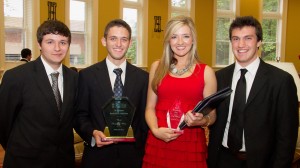
This year's Gillespie Business Plan Competition included competitors (from left) Jonathan Broom; Ryan Rigney, who won the overall Best Business Plan prize; Whitley Miley, who took second place for Best Business Plan and won the Best Women's Team and Best Social Entrepreneurship Idea prizes; and Lee Dubose. UM photo by Joe Worthem
OXFORD, Miss. – University of Mississippi students put their ideas to the test at the recent Gillespie Business Plan Competition and were rewarded with more than $9,000 in scholarship money to seed their startups.
The overall winner was Ryan Rigney of Poplarville, who won $4,000 for Utah Raptor Games. Whitley Miley of Purvis won $2,500 for her concept, Hooves for Hope, and Josh Riggs, a native of Port Atkinson, Wis., who grew up in Cookeville, Tenn., won $500 for Mynewcouch.
The annual Gillespie Business Plan Competition is designed to foster entrepreneurship by encouraging students to develop business ideas. Throughout the competition, students gain knowledge, skills and experience by pitching their business plans to a panel of experienced business leaders. The presentations are similar to what beginning entrepreneurs would make to an angel investor or venture capitalist to obtain funding for a startup venture.
Riggs had worked in the furniture industry for several years and wondered how he could deliver furniture better, instead of in the traditional way.
“I quit my job to start my own business, which is why I am in the MBA program,” Riggs said. “I wanted to learn how to get a business off the ground.”
Riggs said that going through the process of the competition was “tons of fun.”
“The great part about the Gillespie Business Plan Competition is the feedback you get,” he said. “You present to these people who have had success, and they can point out your weaknesses. It is extremely helpful to help you achieve your goals.”
Riggs, who will finish his MBA next spring, was excited to be among the winners.
“I guess we all have ideas, it’s just getting a roomful of people to agree that you have a good idea, when there are so many out there,” he said. This was an extremely worthwhile project.”
“We are thrilled that the Gillespie Business Plan Competition provides such a wonderful opportunity for our students to compete with their business ideas,” said Ken Cyree, dean of the School of Business Administration. “This competition allows experiential learning to take place and prepares students to achieve success in the marketplace.”
Miley’s idea for equine therapy began after she had an experience with a 9-year-old paraplegic girl and saw the impact it had on her life. She said she was shocked to hear she was one of the winners.
“I knew I was competitive; I just didn’t realize how much,” Miley said. “My professor, Dr. Rachel Smith, encouraged me to enter. I thought the competition was looking for more of a new, innovative business plan, and equine therapy has been around for a while, but I think they were looking for more of just a well-written, thought-out business plan. I have a real sense of accomplishment.”
Miley, a marketing communications major and risk management and insurance minor, said she began work on the business plan in late February and took a month to write it.
“Then I worked very hard on the presentation and kept practicing giving my executive summary,” she said. “The Gillespie Business Plan challenge was a good experience, and I learned a lot.”
She also won two additional prizes, worth $500 apiece, for Best Women’s Team and Best Social Entrepreneurship Idea.
Other winners included:
Best Green Idea: Graceful Totes – Mary Margaret Saulters ($500)
Best Interdisciplinary Team: Magnolia Mountain Bouldering – Rob Kinney ($500)
The annual Gillespie Business Plan Competition is organized by UM’s School of Business Administration and co-sponsored by the Gillespie family and the Oxford-Lafayette Economic Development Foundation. The competition fosters entrepreneurship by encouraging students to develop their business ideas into successful startups.
Judging was done by a panel of entrepreneurs and business leaders. Criteria upon which the judges base their decisions include potential profitability, market potential, innovativeness, feasibility, competitive advantage, financial sustainability and overall strength of the business model.
For more information on the School of Business Administration, go to http://www.olemissbusiness.